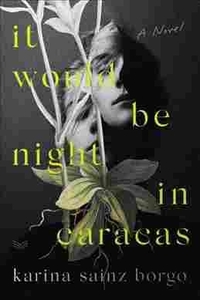It Would Be Night in Caracas by Karina Sainz Borgo
 Monday, November 25, 2019 at 3:57AM
Monday, November 25, 2019 at 3:57AM 
First published in Spain in 2019; published in translation by HarperCollins/HarperVia on October 15, 2019
Adelaida Falcón, the narrator of It Would Be Night in Caracas, begins the novel with her mother’s death and funeral, including her fear that grave robbers will make off with her mother’s glasses. She pays for the burial with one of her last 50-euro notes, the bolivar having become a currency that is useful only for lighting fires. Her neighbors wonder if she will rent out the room in which her mother slept, but Adelaida will not have that chance as criminals take over her apartment. She survives by quietly inhabiting the apartment of a dead neighbor — a salvation made possible only because nobody else has discovered the neighbor’s corpse.
Criminal gangs roam the streets, often under the protection of the police. Food shortages have caused long lines and a thriving black market. Yet Adelaida is determined not to be anyone’s victim. Flashbacks to her time with her mother show us that Adelaida has her own mind and is stubborn about changing it.
The plot follows Adeliada’s scheme to escape to Spain by taking over the dead neighbor’s identity. Yet the story’s power lies not in the plot, which follows a simple and predictable path that depends on unlikely happenstance, but in the details of Adelaida’s life. People Adelaida knows are being murdered. Journalists are killed for reporting the truth. Their sources are killed for revealing the truth. A criminal friend risks his life to help Adeliada, suggesting that crime is sometimes an inescapable circumstances rather than a character flaw.
Adeliada condemns Venezuela’s upper class for judging her as the daughter of a single mother. She also condemns the nation’s obsession with beauty and youth, with keeping up appearances as everything falls apart, with its acceptance of men who walk out on their families. “The result was a nation built on the cleft of its own contradictions, on the tectonic fault of a landscape always on the brink of tumbling down on its inhabitants’ heads.”
Adeliada reserves much of her commentary for what Caracas has lost. Once a vibrant city of immigrants, built with the energy of people looking for a new and different life, the “children of those immigrants, people who bore little resemblance to their surnames, starting heading back across the ocean to countries that were home to other people, searching for the stock with which their own country was built.”
It Would Be Night in Caracas benefits from rich and evocative prose. Still, the novel is largely a howl of pain at the loss of a beloved country. While the plot builds little tension (there’s never a doubt about the outcome), tension is inherent in the anarchy and danger of a city gone feral. As a snapshot of the impossible anguish that ordinary residents of Caracas must endure, the novel has something to say. I recommend it for its value as a snaphot, not for its doubtful merit as a fully realized novel.
RECOMMENDED WITH RESERVATIONS
Reader Comments